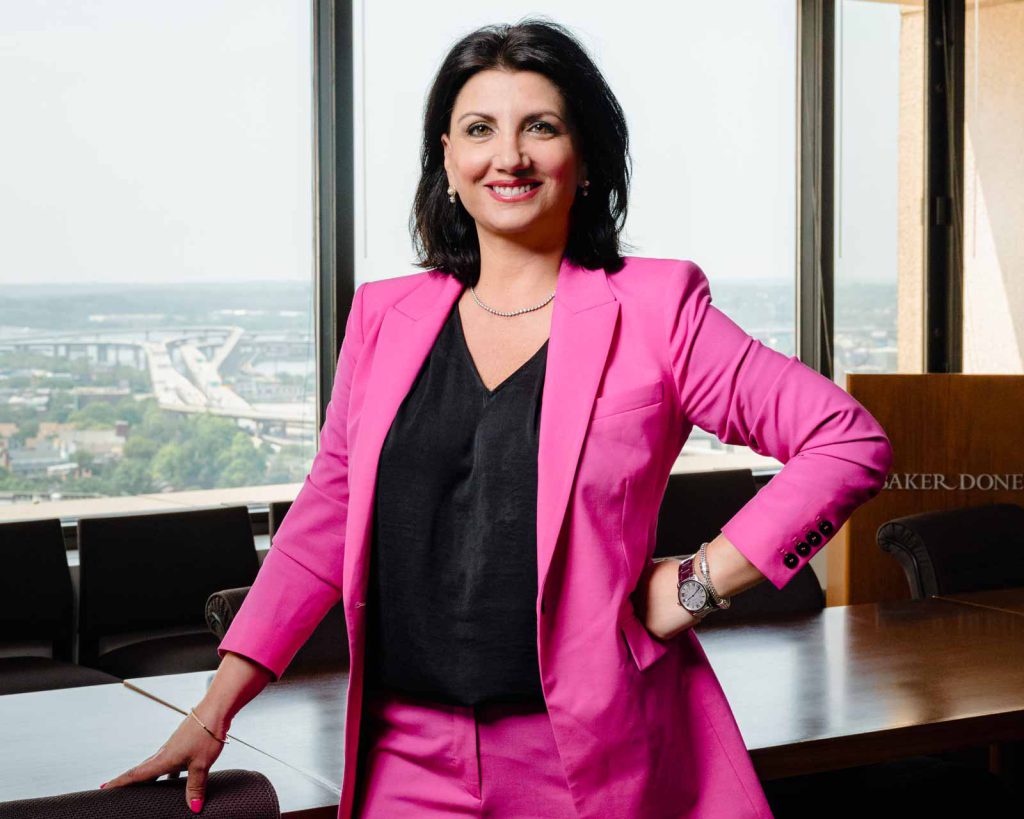BY EMILY HALNON

BIO
- J.D. ’02, The University of Baltimore School of Law
- Health Law Shareholder at Baker Donelson
- Advisory Board, Association for Multicultural Affairs in Transplantation
- Advisory Board, Carlos and Marguerite Mason Center for Organ Donation and Transplant Education and Policy in the Mercer University School of Medicine
- Member, Organ Procurement and Transplantation Network
- Advocate, equity in organ transplantation
Organ donation changes lives, and in many instances, saves them. But the process isn’t as simple as checking a box on a driver’s license. Donation and transplant exist at opposite ends of a process that can be rife with legal challenges for donors, recipients, families and doctors—and very few lawyers with the expertise to help them navigate.
When Melodie Hengerer, J.D. ’02, realized this need existed, she pivoted her legal career. Her sole focus is now on organ transplant and donation, and working with health care providers, tissue banks and organ procurement organizations (OPOs) to guide them through legal and regulatory issues so they can get organs to people who need them. In fact, the bulk of her clients are OPOs—federally regulated nonprofits that serve as a conduit between donors and recipients at transplant centers—that help with everything from authorizing donation to assessing the clinical suitability of an organ for donation.
“My clients operate in a world of high stakes—literally, life and death. It’s an honor to be the one helping them face challenges while doing work that I absolutely love,” she said.
This isn’t the first time Hengerer has pivoted in her career. After ranking fifth in her graduating class at the School of Law and practicing in Washington, D.C., for a short while, she took time off to focus on her family when they relocated to North Carolina. A move back to Baltimore eventually ushered in a new career with the Baltimore City Law Department (which represents the interests of the mayor and city council) a few years later.
When she pivoted once again, this time back to private practice, the self-proclaimed science geek with a background in biology found herself drawn to medical malpractice cases. When she landed a case involving allegations of negligence in the transportation of a donated kidney that purportedly arrived at the transplant center damaged, she knew she had found her niche.
“Everything about that case was so fascinating, since under federal law, organs can’t be bought and sold, meaning products liability law didn’t apply,” she said.
Realizing there was a dearth of lawyers specializing in donation and transplant, she designed and pitched a business plan to Baltimore-based firm Baker Donelson in 2020 that would allow them all to get in on the proverbial ground floor of this nascent field.
Her first client in this space was Infinite Legacy, a regional OPO that manages organ donations across Maryland, Northern Virginia and Washington, D.C. Hengerer helped facilitate a merger among these regions that expanded their service area to nearly 10 million people. She also helped the organization navigate the challenging and often delicate legal issues that can arise as families make the selfless deci-sion to donate their loved ones’ gifts at a time of profound grief and finds it “incredibly rewarding to represent clients who live this inspir-ing mission, day in and day out.” In addition to being inspiring, though, the nature of her work is also inherently complex. One of the biggest challenges in her practice is that issues with organ transplants often exist at the intersection of medicine, law, and ethics—which can be tricky to untangle.
“The work is so interesting because there’s rarely one right answer that fits all three spaces congruently,” she said. “For instance, when a new clinical organ recovery procedure develops, we must seek to understand whether the practice is sound. While I may feel a particular procedure is legally defensible, in contrast, a bioethicist may have concerns about whether that same pro-cedure is ethically appropriate, or vice versa. Ultimately, we try to reach a consensus because we all have the same goal in mind—to maximize organ donation while guarding public trust in the system.”
There are also complicated issues with the allocation of organs, namely, who receives them versus who should receive them, said Hengerer. In a 2022 op-ed for Medpage Today, she tackled the issue of using race-based calculations to determine whether a patient makes it onto a transplant waitlist. Historically, some centers have used metrics that make it less likely for Black patients to get on the waitlist for a kidney transplant. She noted: “Because the adjustment for race can erroneously indicate that Black patients are healthier than they actually are … race-based calculations may effectively disadvantage Black patients when determining their place on the transplantation waitlist.” She works closely with clients to address this kind of medical bias and advocate for a more just and equitable system.
“There’s a lot of interest in health equity and whether organs are allocated fairly,” she said.
As this field continues to develop and respond to the industry as a whole, Hengerer is well-positioned to grow with it. Her business plan has proven successful thanks to her foresight—she’s grown her practice exponentially in just three years, become a shareholder at Baker Donelson, and last year she was a Leadership in Law Honoree (The Daily Record).
“It’s been such a positive change to go from helping people fight about money to doing challenging, but altruistic legal work, especially alongside such dedicated and inspiring clients and such collabora-tive and supportive colleagues,” says Hengerer. “I am so grateful Baker Donelson took a chance on me and this practice, because even if it was later in my career, I’m so grateful to have found this purpose.”
Emily Halnon is a freelance writer based in Eugene, Oregon.
